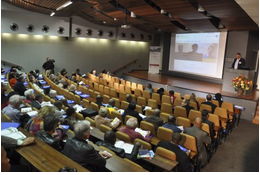The Education Management Association of South Africa (EMASA) conference and its subsequent projects have embodied exactly what it was attempting to ignite; true collaboration. The event was conceived and brought to fruition by a wide range of partners; Bridge, The Bertha Centre for Social Innovation and Entrepreneurship, UFS, Saville Foundation, and the Centre for Education Innovation (CEI) and many more, who shared the objective of bringing together and showcasing transformative projects and their champions who are driving educational innovation.

IkamvaYouth presented on ‘What Works’ at the conference. Presentation.
IkamvaYouth were just one of many organisations that were recognised and included in CEI’s ever-growing international database of innovative projects in education. CEI does not simply describe such interventions, but they seek to better explain their impact, why they work, and how they could be replicated.
The gathering and communicating of evidence of what is working (or not), why it is working (or not) and how it can work in other contexts, is essential for workable replication and scale. Currently too few educational innovations are able to provide evidence of their impact, and where evidence does exist it is not being widely publicised and learnt from. CEI has tasked itself with, among other things, ‘improving the information flows and promoting linkages among stakeholders’.
Fostering stakeholder relationships and partnerships was reflected in the conference theme ‘From Cradle to Career’, which is the idea to connect organisations in a continuous stream of intervention, all the way through childhood and into adulthood. The importance of partnerships is becoming ever more prevalent, with heightened attention around ’collaboration’ as a vehicle for high-impact and sustainable growth.
Collaboration is a concept that is being applied in various different sectors across the world as a powerful tool to increase productivity, efficiency, and longevity. Yet, as much as collaboration is being hailed as the next step to achieving lasting impact, tried and tested ways of successfully doing it in the non-profit sector, are few.
“We urgently need to find new structures that enable effective collaboration. The old ways have failed us. Taking steps towards real collaboration involves building social capital and trust, understanding the obstacles to collaboration (fear, insecurity, lack of effective structures and so on) and lowering these barriers so that people are freed to work together unconditionally towards a common goal.” François Bonnici, Director of the Bertha Centre for Social Innovation and Entrepreneurship.

Joy Oliver, Eugene Daniels and David Harrison
There is no blueprint of how we can best work together and it will always be subject to change. What we can develop are the structures and mechanisms that facilitate it. EMASA showcased the incredible amount of ‘will’ that exists to make collaboration possible within and across sectors. We need to be committed to trying, testing and recording how we are working together. To collaborate effectively you need take risks, to “recognize, accept and even celebrate failure”, David Harrison of the DG Murray Trust.
Just as we encourage our learners to guess and to be comfortable with their likely failure, we must encourage ourselves to look to partners, to foster relationships (even with our adversaries), to find new ways to learn from each other, and to embrace the possibility of disappointment, “because without the failure that comes with experimentation there could be no learning or progress”, David Harrison.
Check out the emasa_booklet_1.pdf here for details of all the partners and inspiring organisations present.

 Lloyd Lungu
Lloyd Lungu